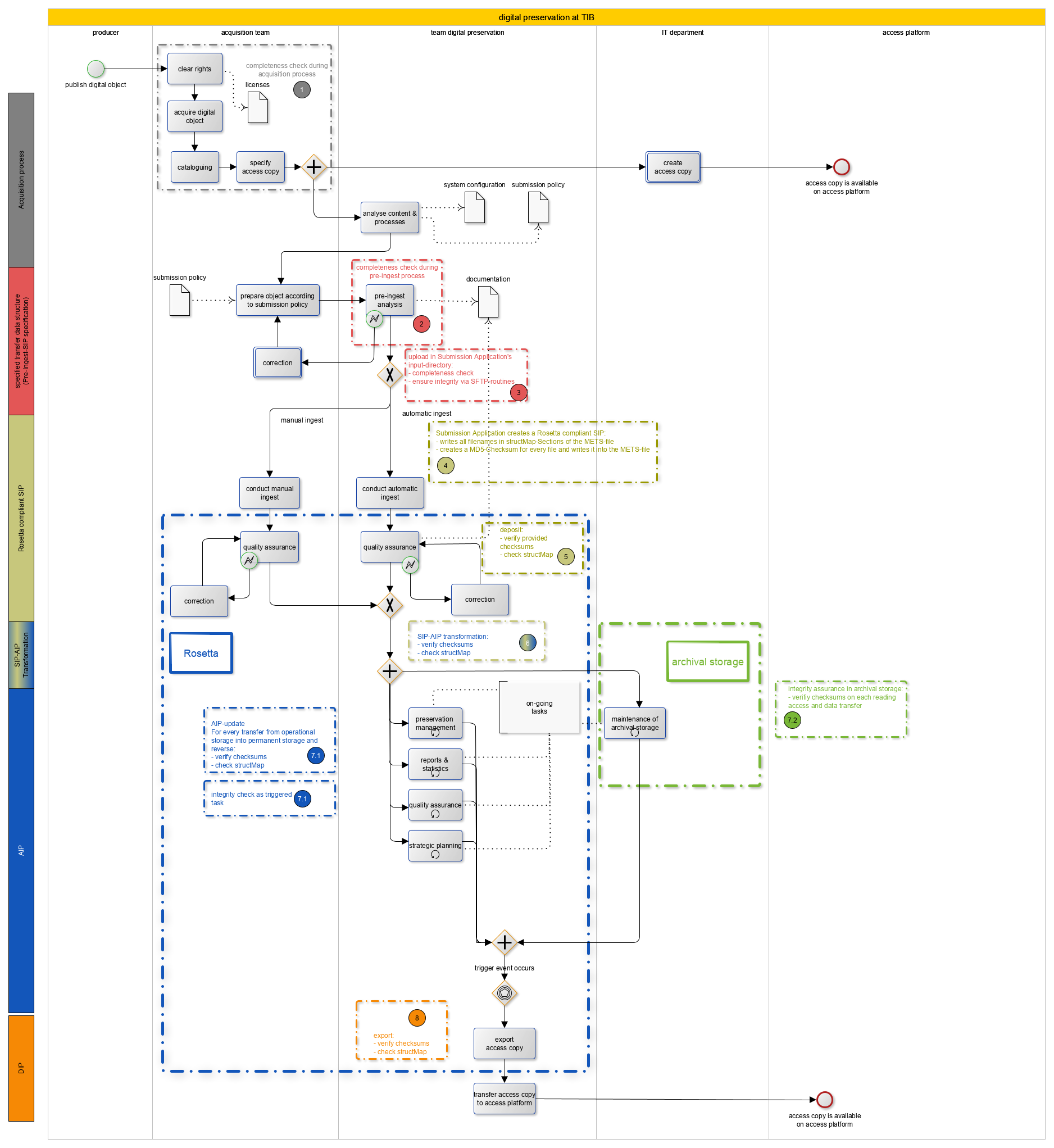- Erstellt von Franziska Schwab am 17. Mai 2019
Preservation of data integrity as part of the process routines
The graphic below Integrity checks in the process organisation shows when in the course of an object’s lifecycle checks are carried out to ensure data integrity and completeness, and how such checks have been implemented in the existing system processes. The headings numbers correspond to the event numbers in the graphic.
1. Completeness check in the acquisition process
When a member of the acquisition team receives a digital object, he or she conducts a completeness check as part of the quality control process. Before retrieving the object, the employee conducts a virus check.
2. Pre-ingest analysis
Checking for completeness is part of the pre-ingest analysis.
3. Uploading of objects in the source directory of the submission application
In consultation with the responsible acquisition team, the Digital Preservation team transfers the objects from the defined transfer directories and copies the objects to a server in the source directory of the submission application using a WinSCP client via an SSH-encrypted SFTP connection.
The SFTP standard contains internal mechanisms to check for integrity breaches during transfer.
The WinSCP client retains the original date and time stamps of the files.
4. Creation of Rosetta-compliant SIPs from defined transfer information packages
The transformation of transfer packages to Rosetta-compliant SIPs and AIP is described in the graphic Transformation of transfer information packages to SIPs and AIPs and the Automatic ingest process diagram.
The submission application, developed using the SDK provided by Ex Libris, converts the acquisition team’s different data structures (transfer information packages) into Rosetta-compliant SIPs. The submission application creates Rosetta-compliant SIPs from various transfer information packages, and transfers them to Rosetta during the second step.
For connecting Leibniz Universität Hannover Institutional Repository to the digital archive via an OAI interface, TIB replicates the ZBW submission application. TIB undertakes the configuration of the submission application itself.
In the process of producing transfer packages, both submission applications create one MD5 checksum per file, which they store in an METS file. The names of all files belonging to the SIP are recorded in the structMap of the METS file.
The Rosetta-compliant SIPs created in this way are transferred to Rosetta when the deposit process is initiated.
5. Deposit: submission of objects to Rosetta
Once the deposit has been initiated, the Rosetta-compliant SIP runs through the validation stack. The following processes are carried out in the validation stack:
- Format identification using DROID
- Format validation using JHOVE
- Creation of three checksums per file; in the case of METS deposit, crosscheck of any checksums also delivered.
- Virus check
- Extraction of technical metadata using JHOVE, mediainfo or the NLNZ Metadata Extraction Tool
- Validation of the METS file
To check for completeness in the deposit process, the StructMap section of the METS file created by the submission application is checked.
6. Transformation of SIPs to AIPs
During the transformation process, the SIP is enriched with additional metadata and moved to various storage areas. Every time a transfer occurs, three new checksums are created and matched with those in storage; a completeness check is also carried out using the StructMap.
7.1 AIP update and integrity check as a process
Every time an AIP is updated, a copy of an IE is moved from permanent storage to operational storage. Every time a transfer occurs, checksums are recreated and matched with those in storage; a completeness check is also carried out using the StructMap. Integrity checks can also be initiated as a process within Rosetta, irrespective of any transfer.
7.2 Integrity assurance mechanisms of archival storage
Archival storage’s mechanisms for integrity assurance are described under Archival storage.
8. Export
Three checksums are stored in Rosetta for each file; during export, the checksums are recreated and matched. All files belonging to the representation are recorded in the ie.xml. This ensures that data integrity is safeguarded during export and that the files are complete.
If an error occurs during export, the process is terminated, and the system displays a relevant error message.
Integrity check in the process organisation

- Keine Stichwörter